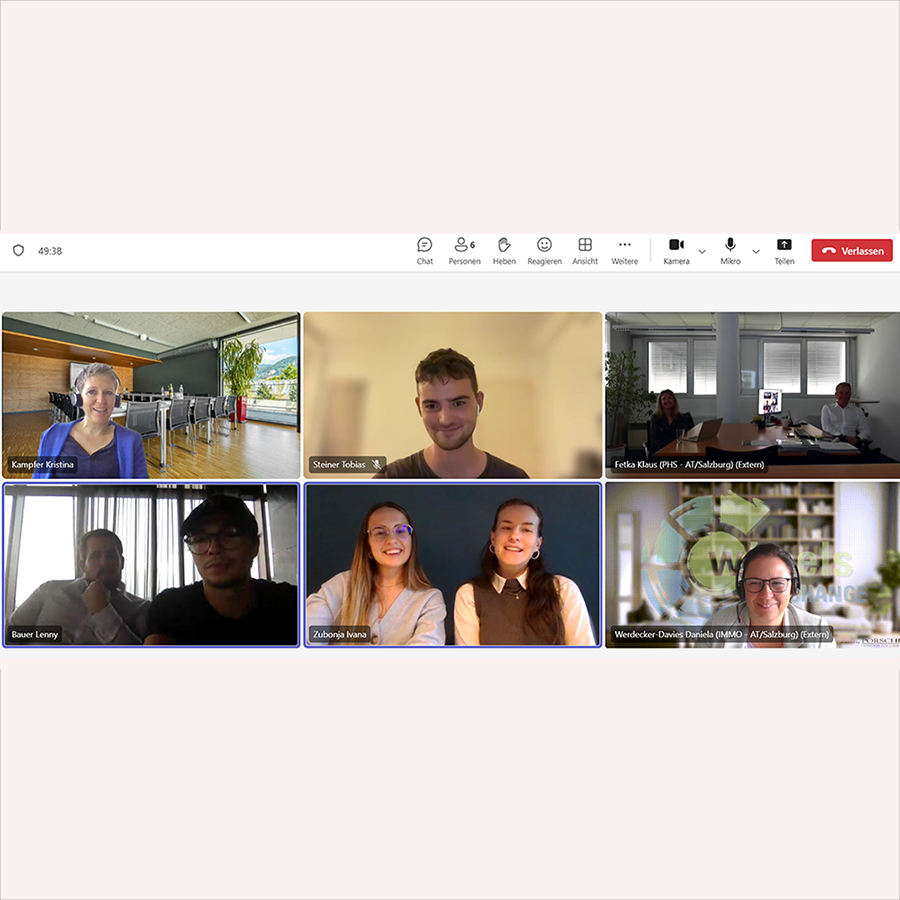Sustainable change: Porsche and the coffee of the future
- 02.12.2024
- Practical Project

Final presentation with employees of Porsche Holding GmbH. (From top left) Kampfer Kristina, Steiner Tobias, Fetka Klaus, Broschek Thomas, Bauer Lenny, Zubonja Ivana, Hatze Pia, Werdecker-Davies Daniela
Sustainability is a central component of modern corporate strategies – and this is also the case at Porsche Holding GmbH. Together with students from the University of Applied Sciences Kufstein Tirol, a concept for sustainable coffee consumption has been developed that not only creates ecological added value but also focuses on enjoyment.
As part of a practical project for the bachelor's degree program in Business Management (now: Leadership & Business Management), students were tasked with standardizing and, at the same time, making more sustainable the supplier structure for the coffee needs of Porsche Holding. The aim was to supply all of the company's coffee machines with products from a single, sustainable supplier in the future.
The focus was not only on environmental aspects: social responsibility and economic viability also played a central role. The aim was to analyze and optimize the supply chains while taking into account ESG (environmental, social, governance) criteria. “A central goal was to reduce the ecological footprint,” explained the students. Measures such as energy-efficient coffee machines, fair working conditions in coffee growing and support for educational programs were incorporated into the planning.
DIVERSITY OF METHODS AND INNOVATIVE APPROACHES
The students used a variety of methods and tools for the analysis and concept development, including:
- As-is analysis: collection of consumption data and supplier structures.
- EcoVadis assessments: comparison of potential providers according to ESG criteria.
- Benchmarking: development of an evaluation system for selecting suitable providers.
- Employee surveys and tastings: involving the workforce in decision-making.
- Cost-benefit analysis: checking the economic viability of the planned measures.
This approach ensured a well-founded assessment and enabled the students to take all aspects of the project into account in a practical way. The involvement of employees was particularly noteworthy: tastings and feedback rounds were used not only to determine preferences, but also to promote acceptance of the changeover.
RESULTS WITH PROSPECTS
The project results provided clear recommendations. Lavazza was identified as the most sustainable supplier, followed by Nespresso, with both companies demonstrating innovative sustainability practices. Reducing the number of suppliers to one main provider was assessed as economically viable, provided that employees support the change.
The students see great potential in the follow-up to the project, for example, in the validation of previous concepts and a renewed update of the cost analysis.
AN ENRICHING COLLABORATION
The students found the collaboration with Porsche Holding GmbH to be an extremely positive experience. “The regular exchange gave us a better understanding of the processes and challenges,” they emphasized. At the same time, coordinating with the company's various departments was an exciting challenge.
The project not only offered students insights into the subject, but also the opportunity to work on a real-life issue in a practical way. With the knowledge and experience they have gained, they are well equipped to develop sustainable and innovative solutions as future leaders.
CONCLUSION
The practical project with Porsche Holding GmbH shows how sustainability, profitability and enjoyment can go hand in hand. With a clear focus on ESG criteria and strong involvement of all participants, the students implemented an impressive concept that is of great value to both the company and their professional future.
Links:
- Porsche Holding GmbH | Website
- Leadership & Business Management | Bachelor's degree program FT
